#and sometimes there are very specific meanings for words in very specific contexts
Explore tagged Tumblr posts
Text
oh, a fun* thing I'm noticing about when I'm writing something is that there's absolutely no descriptions of what anything looks like ever. not the rooms, not people's clothes, just nothing. everything happens in a blank void and no one... is wearing any clothes? no that's definitely not where I was going with that but now I've forgotten what I really wanted to say.
anyway, it's really not surprising and just mirrors how I read things written by other people too - I completely skip over any descriptions like that. can't do anything with it anyway so it's just unnecessary information to me
*not so fun
#context: I have aphantasia#there's no images whatsoever. so knowing what a room looks like doesn't help me at all. can't remember.#I hate detailed descriptions of what everyone's wearing. I mean specifically when it's like. it's described in detail what every damn#character is wearing all the time. as long as it's not relevant I just can't do anything with that. so I skip it#but anyway lol it's probably a very good thing that I stopped thinking I wanted to be a writer when I was like 7.#I wouldn't be able to remember to include stuff like that#but yeah anyway it just makes me sad really lol. feels like I miss like. a pretty big part of things sometimes.#and it's very hard to describe what anything looks like when you can't imagine it. don't know if that's how other people do that but anyway#I just find it interesting. mostly sad. but interesting. I just think it must be so fucking cool to see images in your mind. like damn#people are really out there living like that?? sounds made up but okay#I can just barely imagine a voice if I try really really hard. one at a time. and it takes a lot of practice. other than that?#it's just words.#personal
6 notes
·
View notes
Text
That zombies post circling around is driving me nuts bc tbh silly as it is I’m all for “zombie” media not using an appropriated term that originated in cultural trauma from slavery and the continuing legacy of colonial abuses in Haiti like actually I think we can switch to calling this other thing stragglers or whatever
#loan words are not inherently bad and sometimes they’re going to change meaning#but the specific context of it. the original horror being about having your agency and very self-hood taken away.#idk the whole thing leaves a bad taste ya feel?#but also I don’t want to derail someone’s silly post by going um☝️🤓actually#especially when my source is hearing about that one dude’s book second hand#bramble bramble
1 note
·
View note
Text
In recent posts I've complained that a lot of tabletop RPGs which toss around the term "fiction first" don't actually understand what it means, and I've been asked to expand on that complaint. So:
In my experience, there are two ways that game texts which want to position themselves as "fiction first" trip themselves up, one obvious and one subtle.
The first and more obvious pitfall is treating "fiction first" as an abstract ideology. They're using "fiction first" as a synonym for "story over rules" in a way that calls back to the role-playing-versus-roll-playing discourse of the early 2000s. The trouble is, now as then, nobody can usefully explain what "story over rules" actually entails. At best, they land on a definition of "fiction first" that talks about the GM's right to ignore the rules to better serve the story, which is no kind of definition at all – it's just putting a funny hat on the Rule Zero fallacy and trying to pass it off as some sort of totalising ideology of play.
A more useful way of defining "fiction first" play is to think of it not in terms of whether you engage with the rules at all, but in terms of when they're invoked: specifically, as a question of order of operations.
Suppose, for example, that you're playing Dungeons & Dragons, and you pick up the dice and say "I attack the dragon". Some critics would claim that no actual narrative has been established – that this is simply a bare invocation of game mechanics – but in fact we can infer a great deal: your character is going to approach the dragon, navigating any inclement terrain which lies between them, and attempt to kill the dragon using the weapon they're holding in their hand. The rules are so tightly bound to a particular set of narrative circumstances that simply invoking those rules lets us work backwards to determine what the context and stakes must be for that invocation of the rules to be sensical; this, broadly speaking, is what "rules first" looks like.
Conversely, let's say that your game of Dungeons & Dragons has confronted you with a pit blocking your path, and you want to make an Athletics check to cross it. At this point the GM is probably going to stop you and say, hold up, tell us what that looks like. Are you trying to jump across it? Are you trying to climb down one wall of the pit and up the other? Are you trying to tie a rope to the halfling and toss them to the other side? In other words, before you can pick up the dice, you need to have a little sidebar with the GM to hash out what the narrative context is, and to negotiate what can be achieved and what's at stake if you mess it up; this, broadly, is what "fiction first" looks like.
At this point I know some people are thinking "wait, hold on – both of those examples were from Dungeons & Dragons; are you saying that Dungeons & Dragons is both a rules-first game and a fiction-first game?" And yeah, I am. That's the second, more subtle place where game texts that talk about "fiction first" go astray: they talk about it as though being "fiction first" or "rules first" is something which is inherent to game systems as a whole.
This is not in fact true: being "fiction first" or "rules first" is something which describes particular invocations of the rules. In practice, only very simple games spend all of their time in one mode or the other; most will switch back and forth at need. Generally, most "traditional" RPGs (i.e., the direct descendants of Dungeons & Dragons and its various imitators) tend to operate in rules-first mode in combat and fiction-first mode out of it, though this is a simplification – when and how such mode-switching occurs can be quite complex.
Like any other design pattern, "fiction first" mechanics are a tool that's well suited for some jobs, and ill suited for others. Sometimes your rules are fine-grained enough that having an explicit negotiation and stakes-setting phase would just be adding extra steps. Sometimes you're using the outputs of the rules a narrative prompt, and having to pin the context down ahead of time would defeat the purpose. Fortunately, you don't have to commit yourself to one approach or the other; as long as your text is clear about how you're assuming a given set of rules toys will be used, you can switch modes as need dictates. However, you're not going to be capable of that kind of transparency if you're thinking in terms of "this a Fiction First™ game".
(Incidentally, this is why it can be hard to talk about "fiction first" with OSR fans if you're being dogmatic about fiction-first framing being an immutable feature of particular games. Since traditional RPGs tend to observe the above-described rules-first-in-combat, fiction-first-out-of-combat division, and OSR games tend to treat actually getting into a fight as a strategic failure state, a lot of OSR games spend most of their time in fiction-first mode. If you go up to an OSR fan and insist that D&D-style games can never be fiction-first, then attempt to define "fiction first" for them and proceed to describe how they usually play, they'll quite justifiably conclude that you have your head up your ass!)
#gaming#tabletop roleplaying#tabletop rpgs#game design#fiction first#violence mention#death mention#swearing
2K notes
·
View notes
Text


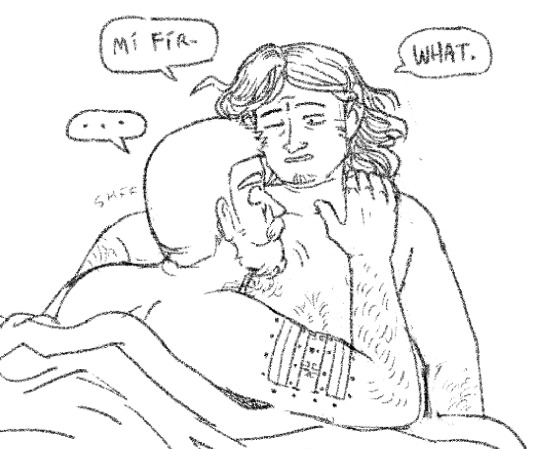

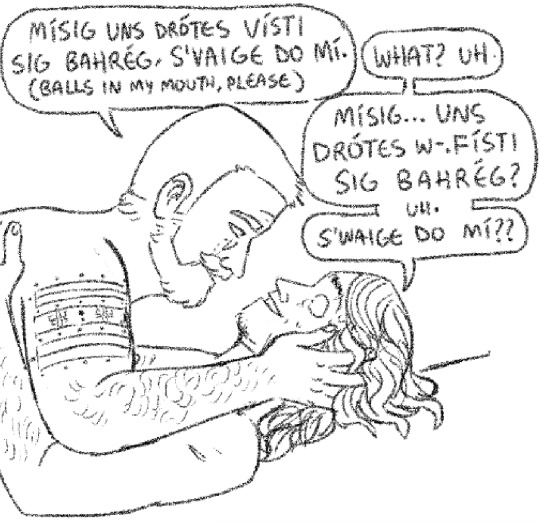

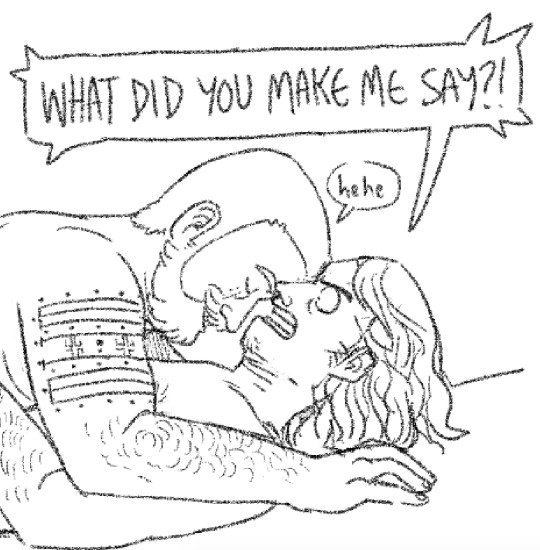
Come On Man.
(Extensive linguistic notes for this 'balls in my mouth' comic under the cut)
The extensive linguistic notes for this "balls in my mouth" comic:
Brakul's first language is the West Rivers dialect of the broader Highlands language, which is part of the Finnic language family. It first split from the Proto-Finnic spoken north of the Viper about a millennia ago with migrants traveling south overseas, and further split into what are now the two native Finnic language groups in Wardin (the Highlands and North Wardi tongues). The Highlands language is a dialect continuum- most neighboring dialects are mutually intelligible, but people from opposite ends of the language's home region would have troubles communicating clearly (though the continuum is not wide enough for any to be fully incomprehensible).
Brakul knew some very, very basic Wardi from occasional contact with Ephenni traders as a teenager, and would later become fluent in the South Wardi dialect as a second language. Wardi is from a wholly separate language family than the Finnic languages with EXTREMELY distant common ancestry, and very different in form and function. Wardi is in many ways less specified and direct, having a smaller variety of individual words to communicate emotional/sensory states and instead imparting many layers of meaning to the same words in different contexts, which Brakul sometimes finds difficult and irritating to navigate. This is one of a number of reasons he often expresses himself more fully in his mother tongue.
Janeys is a native Wardi speaker (South Wardi dialect), fluent in 'Seaway Burri' (which is a lingua franca of the Mouth sea powers, many people along the coastal cities know it as a second language), and semi-fluent in 'High Burri' (state language of the Burri Republic), and in the present day has a modest comprehension of the West Rivers Highlands dialect. This takes place 4.5 years after he and Brakul met, and he mostly just knows basic utilitarian conversational terms and parts of speech, and has a decent understanding of the grammar and how to conjugate verbs. After 13 years of exposure to Brakul talking at him and occasionally deigning to explain what he's saying, Janeys can Sort Of hold a conversation.
---
NOTES ON THE POST ITSELF:
I = Sí
My= Sig
You= Mí (casual) Mís (formal)
---
Mí vírim is “I love you”.
The unconjugated form of the verb is vírir. The dead literal translation is “to need”, but "mí vírim" translates more accurately as "I love you" than "I need you". It DOES have connotations of need, it expresses love as a sense of wholeness and natural dependency- you say it to express affection towards someone to whom you owe your existence, to a line of ancestors, to your descendants, to the people you create or provide for your descendants with. It says "you are part of my sense of place in this world, you connect me to something greater than myself that sustains me". It will mostly be spoken between immediate kin (parents, children, siblings), husbands and wives, and in practice of venerating your ancestors. This is a gay as fuck thing to say to an unrelated man.
There's at least three other ways to directly say "I love ___" one of which is an affectionate expression of camaraderie, one of which communicates strong aesthetic appreciation, and one that is used in practice specifically to express affection/gratitude towards livestock (though can be used more broadly).
Janeys comprehends the phrase "Mí vírim" as “(I) [UNKNOWN VERB] you” and he's able to discern from Subtle Context Clues that it's something like 'I love you'.
He guesses the unconjugated verb inaccurately as (v)írer, as -Er and -Ur verb endings are more common than -Ir endings, and -Er/-Ir verbs share all the same conjugated forms.
Wardi languages have no ‘v’ sound to begin with, and the ‘v’ here is very soft, between a ‘vuh’ and ‘fuh’. This doesn’t come naturally to Janeys (or most Wardi speakers in general) and comes out as a 'wuh' on first impulse and a hard ‘fuh’ when he tries to replicate it.
This is something he never gets good at and Brakul is grateful that it’s his brother who was named ‘Vrailedh’ (Vrai-lehd-hh)) and not him so he doesn’t have to hear ‘Wrai-lehd’ or ‘Frai-lehd’ all the damn time by his Wardi compatriots. (Many of them don't even get his actual name right, but it's a lesser sin of not rolling the R and under-emphasizing the -ul)
---
"Sí brūlmim fágh filshíbe" is “I am very gullible”. The use here is not particularly cruel and is more just that his first impulse upon realizing Janeys will repeat anything he says right now is to make a "someone wrote gullible on the ceiling" level joke at his expense.
Fágh is a word used to emphasize an adjective and some nouns, functionally close to 'very' but used specifically for non-physical/non-sensory qualities (emotion, personality, etc). You could use fágh in the sentence “I’m so sorry” "he's such an asshole".
Brūlmim is "I am" in present tense. The unconjugated form is brūlmur, meaning 'to be' in a permanent sense, as a matter of nature. Other verbs are used for ‘to be’ in a purely transitory sense (“I am tired”) or describing a prolonged but impermanent state, usually past tense (“I was a stupid teenager”).
Filshíbe straightforwardly means 'gullible'.
The 'h' at the end of fágh is vocalized as an exhale, sounds a little like 'fog-uh' with a VERY soft and breathy 'uh'. The '-e' at the end filshíbe is also exhaled, coming out as a quick, soft 'eh'. Neither of these sounds are natural to a Wardi speaker (especially the breathy 'eh', most -e ending words are pronounced with a strong '-ey').
Janeys is comprehending “I’m (very/so) [UNKNOWN WORD]” here, and his face is being touched so softly so [UNKNOWN WORD] is very compelling and he's learning new things and is kind of in the zone so might as well say it back.
---
"Mísig uns drótes vísti sig bahrég, s'vaige do mi?" means "Your balls in my mouth, please?". What makes the sentence Particularly funny to Brakul here is that it's Excessively polite (using a formal and deferential 'your' and very gracious 'please') and jarringly accompanied with lowbrow slang for testicles. A more tonally accurate english translation would be "Sir, may I please perchance take your fat fucking sack in my mouth?"
Mísig means 'your', but specifically implies deference- it's a word you would use to address an elder or authority figure, or to use while being very, very polite. (Mís is the equivalent deferential 'you').
Uns drótes is one of several slang terms for testicles. This one uses the word 'boulders', and is thus Specifically implying 'big balls'. It's lowbrow and a very mild expletive (in the same degree 'ass' is in English).
Vísti means 'in' or 'inside', as a physical state of something being inside of another thing- you would use it for 'there's a bird in that cage' but not 'there's fear in my heart'.
Bahrég means 'mouth', which is almost always used in the purely anatomical sense. The other word for 'mouth' in the language more commonly refers to the mouths of animals (might be better translated as 'maw') and also gets applied to non-anatomical objects (ie 'the mouth of the cave').
S'vaige do mi means 'thank you' (dead literally 'my gratitude to you', the S in S'vaige is a contracted sig/'my') but is translated here as 'please' for clarity. There isn't actually a word that directly correlates to 'please' in the Highlands language, a polite request is accompanied with a 'thank you' instead (IE: "Could you pass the salt, thank you?"). This is one of two direct ways to say 'thank you' and this is the more intensely polite of the two.
Janeys will have understood this sentence as "(polite 'Your') [UNKNOWN WORD] (in? inside? within?) my [UNKNOWN WORD], please." This one throws him off, but he's pretty sure he's about to be kissed on the mouth for the first time in his life so he's willing to go with it.
#This information is buried in the Linguistic Notes Section but this takes place about 4 and a half years after they met#At which point no ones balls have been in anyone's mouth yet#brakul red dog#janeys haidamane
426 notes
·
View notes
Text
i was thinking about el in season four and how the monologue shows mike doesn't understand her as a person, and what he could've said to make it more romantic or just more effective in general 'cause i was kind of like, "wow, it's amazing how effortlessly mike said all the wrong things. it would have been so easy to just tell her he loves her and leave out the things that would hurt her!" but i don't even think that's true tbh??
like, he did royally fuck up in what he chose to say in that moment, but the whole thing was doomed already. idk why i was giving it the benefit of the doubt. their storylines this season were specifically crafted to make sure neither of them could give each other what they need (but that they could both find what they need!!) so that the scene in surfer boy pizza would be the precursor to the final nail in the coffin (season five breakup)
every single interaction they have in season four assures that the monologue won't work. every single interaction between mike and will assures it too, because every time mike tries to communicate with el in the same way he communicates with will, there's a problem, and will doesn't understand that mike makes el feel unloved.
it's all set up so there's no version that would've worked. not by that point in the story, anyway. the second mike said "you're a superhero" in the bedroom...the second she needed to ask him to say it... mike was right, that's a fight you can't come back from.
telling her at that exact moment where she once again had to save the world would just never have been enough because it wasn't a moment where she was just being el and being loved for it. it was a moment specifically about her superpowers. her personhood was relegated at the pinnacle of her "romantic arc."
mike fucked up bigtime with his word choice but i mean... it's very, very hard to sell i love you regardless of your superpowers when you're only saying it to activate those powers. and she knows that. the rest of it is just the cherry on top. the lighting, the lightning, the vines, will's kicked puppy dog look, jonathan's death glare, mike's miserable face, el crying, the lying and the peer pressuring, the fact that even under those circumstances where he is trying to save el's life he is still so reluctant to do it. all of that is terrible but honestly i don't think it would have gone differently without those things.
even if he had figured out how to cut the superhero worship out of it, her abilities (and will) would still be the only reason it would be happening. the context would always ruin it.
if mike was going to say i love you and have it be romantic, it would have been the most impactful when she didn't have them, but if she had to have them, it should've been somewhere, sometime, someplace that had nothing to do with her saving anyone.
they specifically wrote in that mike had multiple opportunities to say i love you and couldn't make himself do it. in the bedroom, when they reunite, at the gas station, in the pizza place. there was potential to give the characters time alone, but they made the choice not to. mike and will had a moment in a tiny van with two other guys and it still felt intimate. they coulda figured something out, but even when they had the perfect opportunity at the pizza place (pre-argyle interrupting) mike couldn't make himself do it, and if you look at her face you can tell she already knew he wouldn't.
we've been conditioned to think that the romantic lead stepping in at the last possible minute and saying what we thought they needed to say the whole time is all that love needs to thrive, like, we're sort of taught to ignore the rest of the picture if they end up where we think they're supposed to at some big, last minute grand gesture and i think that's why milkvans are so ready to accept the monologue as something genuine because theoretically, when we usually see this trope, it tends to work. who cares if they fight all the time? who cares if they can't communicate, have nothing in common, if he gaslights her, if he triggers her, if they both make each other feel worthless? they said i love you! that means it's okay!
anyway idk i'm rambling i just think el deserves so much better than this. and i need to stop giving milkvan the benefit of the doubt for no reason.
✨please free her✨
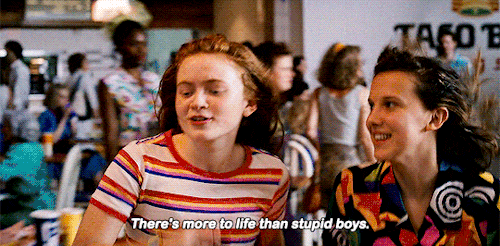
#byler#anti milkvan#gay mike wheeler#anti mileven#gay mike truther#byler brainrot#milkvan is bones#mike wheeler#byler endgame#will byers#el hopper#elmike
138 notes
·
View notes
Text
Mikan wants to be "forgiven"...but what does that really mean?
Hello. This is something that has been quietly on my mind for a while.
It's something shown in the game in chapter 3. Mikan really focuses in on "being forgiven".


And while not a mistranslation per se, I think it's inaccurate to what is happening in the game.
I've talked about this extensively - the fact ENG DR team has a very bad habit of translating things literally or very directly. This leads to either clunky dialogue, missed nuances, or just incorrect interpretations sometimes.
I think this in particular falls somewhere between 2 and 3. I'll explain why.

If translated literally, the English text works just fine, but as with a lot of literal translation, it misses the "feeling" of what was trying to be conveyed. If you want my translation...
Mikan: Won't someone just tell me what I did wrong!? Why won't anyone just let it be already!?
While Mikan doesn't say "What did I do wrong", there is a subtle emphasis on her talking about herself...I feel like it's a more natural way to word what is essentially "What is it that I did differently [to warrant this]?"
Anyways, to the main point...I hope you can kind of see what I'm getting at.
"Forgive" feels like...Mikan is seeking people to "pardon" her for perceived wrong-doings. And while not untrue I would say, the way Mikan specifically uses the word and the context it is in, to me, feels much more like she is using it like "allow" or "excuse".
Let me use another example to better explain myself.



The last line to me reads like Mikan needed this person to pardon her for being born; for existing. That her existence in and of itself was a mistake or wrong-doing that needed to be forgiven.
I think that's missing the point, though.

Mikan: They allowed me to exist.
See, the point is...Mikan is a very troubled person. She admits as much in the freetime events that wherever she goes, she is horribly bullied just for existing. That she hated being bullied, but even more she hates being forgotten.
She emphasizes her beloved (Junko) did not hate her, and in fact allowed her presence...


This line was heavily misread, I think. 許して受け入れて was read as two verbs in one sentence (which it is) but as "forgive and accept" which is incorrect to what it means. It's closer to "they tolerated me" (like, accepting and moving on). Which comes to how I would translate it, and my final point:
Mikan: They accepted me for who I am.
This is why I think the "forgive" thing is not only incorrect, but actually opposite of what this scene was going for. Junko did not "forgive" Mikan for the sin of existing. Rather, she was the only person who seemed to not mind that she existed, that didn't bully or ignore her.
She didn't "forgive" Mikan, she allowed her to be herself.
Another reason DR3 totally missed the mark, but I digress...
I guess while I'm on the topic, we all know that scene where Mikan has a little back-and-forth with Nagito...that, too, was misrepresented somewhat.





Putting the English here just for comparison sake. And while not the worst translation in the world, it certainly isn't how I would go about it.





Nagito: I don't...really get what you're trying to say... Mikan: Oh, you don't? (lit: you don't understand?) Mikan: Is that because you don't have any loved ones in your life? Mikan: Is it because there's no one who will love you?* Mikan: Oh, you poor thing...I feel very sorry for you.
*Literally speaking, she says "Is it because you are a person nobody allows" but considering the context thus far, it's easy to conclude she means that there's no one who will love/accept him for who he is.
*Adding "also" to the line is a mistranslation, I believe. も means also but it is also used for emphasis, which I think it is here. Not that it's impossible Mikan is using it to say "also", but in these lines of dialogue she is intentionally contrasting how she does have someone who loves her and that she can love, so to then identify a similarity between her and Nagito, I think, wouldn't make much sense...
Mikan is one of my favorite characters, so little details like this matter a lot to me.
235 notes
·
View notes
Text
Watching The Apothecary Diaries and from a character perspective I love the detail of the pipe, the one used in the warehouse explosion. In just a few, literal seconds of storytelling we're shown quite clearly who Maomao is:
She notes that she "accidentally" took the pipe with her. Despite being a poor commoner surrounded by luxury, she resists most temptations towards theft. There's one moment - was it when she went to Ah-Duo's palace? - where she notes that anyone with so many nice things wouldn't notice something small going missing, but then she knocks herself out of that thinking. Maomao isn't some #pure protagonist who'd never even consider such a thing, rather she's an upstanding and smart individual who realizes this is both wrong and, notably, a dumb move if she gets caught. Maomao is careful to ask for the materials she needs to pull off the bomb experiment and there are times when, even basking in a love of herbs, she will not pick them if they're from someone else's garden. Maomao respects others' property and not even her hyperfixations will override that (a common flaw in other single-minded protagonists). This also dovetails nicely into her admission that she and Luomen built a lot of things they needed because she grew up poor. Who's to say how hard someone else worked to make/buy/secure that object?
Sidenote: It's interesting to me that the exception here seems to be Jinshi. Just an episode earlier Maomao tried to fleece him of who knows how much through the sale of Granny's "educational materials," which, you know, is very much theft. Beyond the fact that the general wealth of a noble differs greatly from the specific possession of a commoner (or even a woman concubine), it feels almost... intimate to me? That's not quite the word I'm looking for, but I mean that Maomao allows Jinshi to influence her in ways she doesn't let others, at least outside of her immediate family. Another notable example of that is her unwillingness to fake an interest in him. We see many times over the course of the show - facing off against the women in the outer court, acting as a courtesan for the night, etc. - that Maomao is perfectly capable of playing the smiling, docile, hapless woman society expects. Yet from day one she's refused to apply that mask for Jinshi's sake and, in turn, despises when he turns his charm mask on her. Maomao wants people to exist plainly, just as she normally does... and a part of that is accepting that she's sometimes an imperfect, immoral person. Weirdly, trying to steal from Jinshi feels like an act of trust towards him, both on a safety level (I trust that you won't punish me too harshly if I get caught) and an emotional one (I trust you to see an important part of my character: that I'll bend and even break the rules for my family's sake).
Moving on, Maomao is also incredibly practical and is living under the realities of a) poverty and b) a patriarchal society. She notes many times throughout the series (this episode included) that Luomen is terrible at turning a profit and Maomao herself owes Granny a fair bit. Combine that with the reminder that she was just fired from one position after being kidnapped from another and of course Maomao thinks about selling the pipe. She didn't intentionally steal it and - crucially - she has no reason to think it's still important to the investigation, but now that it's in her possession she might as well make use of it. Clean it up, find a new mouthpiece, and sell it off for a good price. Maomao is constantly thinking about the price of things, particularly in the context of whether she, a commoner, deserves them and that leads to her likewise noting the everyday objects that could make a big difference in her life, things that others don't even notice. For Jinshi that's just a useless stack of papers to burn; for Maomao they're a potential source of income, translating directly to her father keeping a roof over his head. Class is HUGE in The Apothecary Diaries, so of course Maomao takes one look at a beautifully carved pipe and considers how much she could sell it for.
...but she doesn't. Maomao looks closer still, uses those keen deduction skills to assume the pipe may have sentimental importance, and decides to give it back. Laomen isn't in immediate danger of being evicted, she may have just snagged him a new customer in Lihaku, and Granny isn't hounding her too much, so soft-hearted Maomao is going to put practicality aside and return it. Because she is soft-hearted. This is the girl utterly committed to the big gestures - risking exposure to warn two mothers about the poison killing their babies - as well as the small: staying up night after night to sew pockets into everyone's clothes just so they might be a little warmer for one festival. Now here, Maomao decides to still clean up the pipe. It's not enough to just return it, she's going to return it in pristine condition, even though that won't net her anything other than a potential 'Thank you' now. For me, Maomao so often embodies the message that when peoples' basic needs are met, they're then free to be quite kind to one another.
Love this girl. So, so much.
349 notes
·
View notes
Text
There's this idea floating around the general TTRPG space that's kind of hard to put one's finger on which I think is best articulated as "the purpose of an RPG is to produce a conventionally shaped satisfying narrative," and in this context I mean RPG as not just the game as it exists in the book but the act of play itself.
And this isn't exactly a new thing: since time immemorial people have tried to force TTRPGs to produce traditional narratives for them, often to be disappointed. I also feel this was behind a lot of the discussion that emerged from the Forge and that informed the first "narrativist" RPGs (I'm only using the word here as a shorthand: I don't think the GNS taxonomy is very useful as more than a shibboleth): that at least for some TTRPGs the creation of a story was the primary goal (heck, some of them even called themselves Storytelling games), but since those games when played as written actually ended up resisting narrative convention they were on some level dysfunctional for that purpose.
There's some truth to this but also a lot of nuance: when you get down to the roots of the hobby, the purpose of a game of D&D wasn't the production of a narrative. It was to imagine a guy and put that guy in situations, as primarily a game that challenged the player. The production of a narrative was secondary and entirely emergent.
But in the eighties you basically get the first generation of players without the background from wargames, whose impressions of RPGs aren't colored by the assumption that "it's kind of like a wargame but you only control one guy." And you start getting lots of RPGs, some of which specifically try to model specific types of stories. But because the medium is still new the tools used to achieve those stories are sometimes inelegant (even though people see the potential for telling lots of stories using the medium, they are still largely letting their designs be informed by the "wargame where you only control one guy" types of game) and players and designers alike start to realize that these systems need a bit of help to nudge the games in the direction of a satisfying narrative. Games start having lots of advice not only from the point of view of the administrative point of view of refereeing a game, but also from the point of view of treating the GM as a storyteller whose purpose is to sometimes give the rules a bit of a nudge to make the story go a certain way. What you ultimately get is Vampire: the Masquerade, which while a paradigm shift for its time is still ultimately a D&D ass game that wants to be used for the sake of telling a conventional narrative, so you get a lot of explicit advice to ignore the systems when they don't produce a satisfying story.
Anyway, the point is that in some games the production of a satisfying narrative isn't a primary design goal even when the game itself tries to portray itself as such.
But what you also get is this idea that since the production of a satisfying narrative is seen as the goal of these games (even though it isn't necessarily so), if a game (as in the act of play) doesn't produce a satisfying narrative, then the game itself must be somehow dysfunctional.
A lot of people are willing to blame this on players: the GM isn't doing enough work, a good GM can tell a good story with any system, your players aren't engaging with the game properly, your players are bad if they don't see the point in telling a greater story. When the real culprit might actually be the game system itself, or rather a misalignment between the group's desired fiction and the type of fiction that the game produces. And when players end up misidentifying what is actually an issue their group has with the system as a player issue, you end up with unhappy players fighting against the type of narrative the game itself wants to tell.
I don't think an RPG is dysfunctional even if it doesn't produce a conventionally shaped, satisfying narrative, because while I do think the act of play inevitably ends up creating an emergent narrative, that emergent narrative conforming to conventions of storytelling isn't always the primary goal of play. Conversely, a game whose systems have been built to facilitate the production of a narrative that conforms to conventions of storytelling or emulates some genre well is also hella good. But regardless, there's a lot to be said for playing games the way the games themselves present themselves as.
Your traditional challenge-based dungeon game might not produce a conventionally satisfying narrative and that's okay and it's not your or any of your players' fault. The production of a conventionally satisfying narrative as an emergent function of play was never a design goal when that challenge-based dungeon game was being made.
612 notes
·
View notes
Text
JM & The Peacock
Quite a few people have been waiting for this post so I hope I can do it justice. Here we go…

There are different ways for people to peacock, and different reasons why they might do it. Think about it like this: when you go to a job interview, you want to have a bit of pizzazz, right? You want the interview panel to walk away thinking, they’re a perfect fit, and forget about all the other interviewees. Peacocking is what people (and animals) do to show they are a good fit for something, and something is usual mating/partnering. *chokes*
Is it always romance and relationships? No. When we’re trying to make new friends, some level of peacocking can occur, too, depending on personality type. When we make new social connections, invariably people want to demonstrate their value as a connection. To a potential friend, you are saying “I’m fun” or “I’m worth knowing,” and you might do that by showcasing all your dirty Hannibal fanfics or your collection of priceless Fabrege eggs.

What does this have to do with our favourites, KM? Well, I hope I’m not bursting any bubbles here, but JK seems to have gone through a peacocking phase with Jimin lasting from sometime in 2014 and calming by 2018. And, just so we’re clear, I’m not talking about peacocking in the pick-up artist sense, where someone wears something outlandish to attract interest in hopes of a hookup. As I said, I’m specifically talking about the acts some people do to differentiate themselves as worthy mates. And these behaviours tend to have attention-seeking qualities, hence the connection to the word. So, yes–you got me–I am saying that JK has done things to show himself as a good potential mate for JM. As much as I try to rationalize this list of actions, I can’t possibly understand them in any other context. If they just have a bromance, it’s the wildest bromance on record. o.O
Let’s get to it. JK loves demanding and holding Minnie’s attention. But, peacocking is more about sending a specific message through your actions to your desired. These are my favourite “peacocking” moments. Maybe you can even add to the list![[MORE]]
JK using a soccer ball to lure Tae away from JM and then take his place
This is a really early example and you could almost write it off as just a flirt tactic, if it wasn’t clear JK was scheming, knowing the camera was capturing everything he did. That means he knew that at some point JM would see what he did (message = received). Tae is sitting beside JM, so JK kicks the ball toward him, and as soon as Tae goes after the ball, he swiftly takes his place next to JM. This is a clever and cute way to demonstrate the lengths you’d go to be beside someone, and I would have loved to see JM watching this video at the time.
Consistently ranking Jimin lowest in looks
For the first year or so, JK was constantly put on the spot to rank the members according to their looks. Invariably, he always ranked JM the lowest. Why is this peacocking? It fits the pigtail-pulling school of flirting, of course, but it’s also a very loud way of differentiating yourself. He’s drawing attention to JM by placing him last over and over. I bet you never remembered how he ranked Suga, for example. He’s also showing daring because he’s not catering to the feelings of JM. In a lot of ways, he’s saying to JM, I know you can take it, so come play with me at this level. He’s not being mushy or soft.
Backhug slow dance

Hmm, doesn’t this look like something you’d expect KM to do now? But this is from 2015. They are at an event, dressed to the nines, and JK pulls JM into a romantic slow dance. He’s skirting his hands over his hip bones and pelvis, leaning and caressing. This is very “I’ve got you, babe, and I don’t care who knows.” Given the time frame of this, it feels very peacock-y and a little shocking.
The on-stage stare (0:10)

Again, this is c. 2015ish. And this moment was one of their first, big public stares (lol, what a sentence). Prolongued, unbroken eye contact is not a platonic action, and JK’s body language here is very assertive. Since our society is super heteronormative (yuck), if you were to replace Jimin with a lady, what would your conclusion be? Probably that JK is “staking a claim” or “making his interest known.” Given the context of this moment (surrounded by an audience during a concert), it seems more like JK is making a statement to show his boldness and lack of fear when it comes to JM. He’s saying, Yep I’m looking at you and everyone can see. Got a problem with that? He’s setting a bar and asking JM to join him.
The Run BTS police episode with the spanking

This clip has been discussed a million times, but let’s think about the context. They’re shooting a variety show. There’s probably 10+ people watching them behind the camera, plus the other group members. So what does JK do? He shows off his strength and his dominance, lol. He’s saying, I can take care of you but I can do with you what I please. And I don’t care who sees. If that sounds a bit too overbeaing, think of it like this: he’s saying, We can play like this, and I’ll start. And, if you watched the whole episode, you’ll know that JM does return the play. He smacks him a little too hard with a book. Oopsie! (caveat: we don’t know what was filmed first, but I would still hazard that the smack came after this).
Stealing candy from JHope to give to Jimin (6:55ish)
I love this one because it’s as basic as it comes. Minnie seems to want a candy, so JK just grabs it from JHope and gives it straight to Minnie. Well, he actually feeds it to him directly. Oh boy. And I love Hobi’s face because he’s smiling as he looks at JK, but once he looks away, he’s got unmistakable distaste on his face LOL. But, this one is really transparent, and JK’s self-satisfaction is apparent in his swagger as he does it. JK is like, You need something? I will get it for you, no matter what it takes (even if I’m annoying my Hyung). Showing preference and a willingness to put someone before others is a definite sign of interest and worthiness. I will put you first.
Walking through a sprinkler unbothered (BV2)
Okay, this is classic peacocking for a few reasons. Before JK walks through this sprinkler at the urging of Tae & JM, he was standing on the rocks looking at the ocean with the two. Then, a wave came in and splashed him, and only him. JM died of laughter, and JK was a little embarassed. It was genuinely funny. But, if you’re trying to impress your desired, you don’t want to let on that you’re annoyed/mortified that the perfect moment was wrecked? That would show too much ego and pridefulness. So, when there’s a suggestion to walk through a sprinkler, he accepts without hesitation: water is no foe of mine! It’s all about showing you don’t care in front of your desired, but also taking another opportunity to make that person laugh.
Re-enacting Jimin’s songs & dances for comedic effect
There are many examples of this, especially of the song Lie in particular. JK loves to mimic his singing and dancing, but what’s really going on here? He’s showing he knows all of JM’s lyrics, how to sing the song and how to do all the dance steps. He’s also paying homage in a way that makes JM laugh. And, it also ensures all eyes are on him for something that relates to JM. Isn’t that interesting? o.O
GDA 2017 dance
Ah, this is one of my all-time favourite examples. Peacocking is all about drawing the attention of your desired, and what does JK do? He decides to sexy dance for JM on TV and in front of a live audience, and yes, that dance is for JM, not for us nor for the audience present… You might be thinking, oh, he’s just being goofy. Did you see JM’s reaction? That isn’t the reaction of “my friend is a goofball” – that’s rare shyness on JM’s behalf. This one, like others, is about fearlessness and not caring who’s watching. And that fearlessness is about daring to be a bit sexy for JM on purpose in front of others, as well as saying, I’ll embarass myself just to put a smile on your face.
As you can probably see from the list of examples, a lot of these actions are designed to invite JM to either play with him in a certain way, or show JK’s daring. Flirting (and mating) rituals are as much about play as they are the biological stuff going on in the background. We look for people who play how we play, enjoy what we enjoy and respond to our behaviours in a desireable way. Consider this: if baby JK did the slow dance with JM, and JM just turned around, slapped him and walked away, that would be a clear message, wouldn’t it? Or, if in the Run episode, instead of returning the play, JM was angry or annoyed, wouldn’t that show incompatibility and a misstep on JK’s part? Hmm!
As a relationship evolves, actions that would be seen as peacocking during a courthship period become affirmations. Examples of this could be grabbing the giant chunk of snow in the hills in New Zealand, the GCF video(s) and Rosebowl. And beyond these meaningful actions, JK’s peacocking has really translated into over-the-top, cornball flirting. Some examples:
Do you smell something burning? … My heart is burning.
What do you get when you mix blue and red? … That’s right, I purple you.
Singing “Jimin nothing stronger” to the tune of BwL.
Reading a fortune cookie to Jimin during an official interview (+room full of people) and saying his name informally. “May I say this to you? Jimin-ah, if you’re not #1, it’s okay. (Where are you going??) You’re always #1 to me.”
His mock use of the impersonal “Jimin-ssi” in so many different flirty tones.
Does JM peacock? He does, but not in the same way. JM is about affection and possession. JK has always been the apple of his eye, but over time, he became JM’s prize, or his prince to put it in a less weird way. And, JM has always been content to show his clear desire for JK without any subtlety. Perhaps we could think of it like JM tells and JK shows. JM does show too, but let’s consider these paraphrased lines:
I like you so much I don’t know what to do
I can’t live because of you
We are in a love relationship
On my day off, I will go on a date with Jungkook
I want to go on a trip with Jungkook
Jungkook I promised to go to the moon with me Jungkook
The person who makes me happiest is Jungkook
The thing that makes me happiest is when I wake up and see Jungkook
209 notes
·
View notes
Note
One small thing I noticed about AYS is that Jikook didn’t really give their trip a specific meaning. This thought came to my mind after I rewatched JK’s messages on fancafe from early 2019 when he traveled with his brother and their hometown friend. JK said that it was just the three of them, three men together, and called it a friendship trip. Those two are older than JK and not really his friends, yet he still referred to it as a friendship trip. Looking back at AYS, they never defined the show in terms of friendship, brotherhood, or even colleagueship, even when Tae joined them for three episodes. I found this quite interesting.
Hi anon,
This kind of ambiguity is very characteristic of Jikook. They are the ones who consistently leave things open to interpretation, which I believe is one of the main reasons their bond is scrutinized and questioned more than any other pairing.
Unlike the other members, who have explicitly described the nature of their relationships with each other, Jimin and Jungkook have never really done so. Regarding their trip, the only thing they shared was that it was something they had discussed and agreed to do before enlisting. However, they provided no further details about why they chose to go, what it meant to them, or any deeper context. Whether this was intentional or not is unclear, but it’s something I’ve noticed they tend to do quite often.
In general, it seems to be a pattern for Jikook to keep things about their bond deliberately vague. Both Jimin and Jungkook openly and explicitly express their feelings toward other members….for example, Jungkook doesn’t hesitate to profess his deep admiration for Namjoon or to casually tell the others, “I love you.” Yet, for some reason, he seems to struggle to say those words publicly to Jimin, even when Jimin says them to him. Similarly, Jimin has spoken about Taehyung being his soulmate and has openly expressed his love and adoration for Hobi, making it clear what they mean to him. But when it comes to Jungkook, there’s often a certain ambiguity….sometimes, Jimin simply refers to Jungkook as “my donsaeng” without elaborating further.
Ironically, I think this vagueness exists precisely because their relationship isn’t as straightforward as the ones they have with the rest of the members. With the others, they can express their emotions freely because there’s nothing to conceal. However, with each other, it feels like there’s more at stake…more to protect. Jungkook’s reluctance to publicly say “I love you” to Jimin, despite saying it so easily to the other five members, suggests that those words hold a different weight when directed at him. It’s easy to say “I love you” when it carries an innocent meaning, (under their circumstances) but it’s much harder when those words are laden with deeper significance. This, to me, is likely why they tend to be vague about their actions and the nature of their bond.
161 notes
·
View notes
Note
That friend on another site that I told you about a while ago said that the feminists who first started worshiping Lilith did blame Western religious systems in general for sexism, but they didn't have any ill will towards Jews specifically. Are you willing to buy that?
I am very willing to say that the first 20th century feminists to bring Lilith into the conversation were not being antisemitic, because those feminists were Jewish. Their work is confronting, nuanced, and interesting. I don't always agree with their conclusions, but I certainly wouldn't call this examination of the place of Lilith in Jewish thought antisemitic or unwarrented.
However, almost immediately, once Gentile feminists (and specifically Gentile feminists of a Christian cultural background) got their hands on Lilith, it was a different story, and one that requires an examination of what is meant by "Western religions".
"Western religions" are contrasted with "Eastern religions", or more tellingly "Eastern Spirituality", a framing which posits two diametrically opposed worldviews and approaches to spirituality. This framing by its nature flattens such disparate traditions as Zoroastrianism and Shintoism, and applies what might be termed an orientalizing lens. It is, in other words, a bad model which expresses the biases and assumptions of its proponants, and leads to misunderstanding and bad scholarship, and also kind of racist. It was also a popular model in the mid 20th century.
It's important to note here that feminist spirituality and neo-Goddess worship were becoming a thing at exactly the time when a Western curiosity about "Eastern Spirituality" was hitting the mainstream. And because of a complicated stew of historical and cultural factors, almost all of these Western spiritual seekers approached "Eastern Spirituality" not as disparate living traditions, which are part of their own cultural contexts, and which are the traditions and worldviews of actual societies, which, as human societies, are far from perfect examples of enlightenment, but instead approached "Eastern Spirituality" as a single entity which could be stripped of context and turned into something to be consumed by a western audience, and also as the antidote to a spiritually bankrupt western capitalistic society. These Eastern teachings are just soooo enlightened, maaaan. This very much informed the framework of Western vs Eastern religions.
As for Western religions, this is a category I often see expressed in slightly different ways. I've neen this grouping called "Western religions" or even "Western religion", or Abrahamic religions (by which the speaker typically means the Abrahamic religions they have heard of, given that most don't seem to realize that there are in fact quite a few Abrahamic religions, not just Islam, Christianity, and Judaism) or sometimes it's monotheism or the monotheistic religions. These are all the same group, but the rhetorical focus is slightly different. Western religions are contrasted with Eastern religions or sometimes "non-Western religions,", monotheism with polytheism, and the Abrahamic religions with everything else. And a most cases, which goes up to nearly all cases where a value judgment is being made, what the person doing the grouping really means is "Christianity and the religions I assume are basically just Christianity." It's a framework that makes a lot of incorrect assumptions about what Judaism is, and assumes that anything the speaker objects to in Christianity is present in, and ultimately comes from Judaism. It's also a framing that by contrast assumes that these things which are bad about "Western religions" or "monotheism" are not broadly present in other religions, and are unique to Judaism and its descendents.
That last consideration is extremely important, because it's hard to argue that "Western religions" are responsible for x bad thing, when that bad thing is far from exculsively found in "Western religions" Most polytheistic traditions currently and historically have practiced some form of patriarchy. Worship of powerful goddesses does not seem to make these societies less oppressive for human women. Another popular argument I see is that monotheism brought religious intolerance into the world, but again, the idea that polytheistic societies are inherently religiously tolerant, and we have no evidence of religious persecution until monotheism came on the scene, is a myth. It's also with seeing these other terms for the same goup, and the comparisons people are using this grouping to make, that it becomes possible to understand why Hellenistic or Norse paganism, for example, are not part of the umbrella of "Western religions."
It's important to note here that it's a standard part of the Christian intellectual tradition that goes back almost to the creation of Christianity, that all the good parts of Christianity are from Jesus, and are "True Christianity" and all the bad parts are Jewish things that were insufficiently purged. Judaism-and-the-Jews-as-responsible-for-all-of-Christianity's-flaws is an old antisemitic trope, and one which has gained purchase among critics of Christianity globally.
The 20th century feminists who pioneered so-called feminist spirituality and neo-pagan Goddess worship latched onto an anthropological theory popular in the 19th century, that before the rise of patriarchy, societies went through a matriarchal, fertility, focused goddess worshipping phase. It's really really important to note here that by the time 20th century feminists got their hands on this idea, it had been already widely discredited. Anthropologists and archeologists no longer took it seriously, because after a certain point, it became really obvious that it did not fit the evidence.
Also in its original formulation it was really racist, as almost all anthropological theories popular in the 19th century were. See, the original idea was that societies progressed through stages, and that fertility focused matriarchal goddess worship was an early primitive phase, that societies passed through on their way to "higher civilization". The best and most civilized societies were (obviously) 19th century Western European ones, so societies closest to that were further along and more advanced, while societies further from that could be grouped according to which "stage" they reached.
20th feminists took this debunked, discredited formulation and flipped it on its head. Instead of matriarchal fertility-focused goddess worship being a phase societies passed through on their way to higher (patriarchal) forms of civilization, it was actually the natural state of humanity that we had fallen from, and needed to reclaim. It became a feminist Eden.
And who was the serpent in this feminist Eden, offering the fruit of the tree of patriarchy? Why, it was those first monotheists, the Ur-Abrahamic* religion, Judaism.
It's likely that a lot of the people reading this saying, hey, you are going way too far and reading way too much into this. Christianity is included in "Western religions", and nobody is being singled out, and that's a whole lot of well-meaning and progressive people that you are accusing of deliberate antisemitism. To which I say, I'm not actually accusing anyone of deliberate antisemitism here. I am saying that in a society where antisemitic tropes are a bulwark of the intellectual tradition, it's easy to accidentally and unconciously incorporate those tropes and narratives into any new, or not so new, ideas. As for whether Judaism was singled out, the fact that all these gentile feminists picked Lilith, a figure not present in Christianity, or Islam, but only in Judaism, shows who, consciously or not, they were holding responsible for patriarchy in "Western religions".
*According to the Torah, Abraham came from the city of Ur. This is a joke. I am very funny. Please take this opportunity to chuckle in a sensible and dignified manner.
#and ultimately this is all less important to me than the fact that current Lilith worshippers are in my experience virulently antisemitic#jewish#lilith#a s fischer original#there are no stupid questions
155 notes
·
View notes
Text
Some fun translation facts about Yingdu...
-Xia Fei doesn't necessarily call Vein "warm-hearted." “热心肠" doesn't mean warm-hearted, as in compassionate. It's based on 热心, or passionate. You use it for someone who's helpful, whom you can expect to speak up for people, but not necessarily someone who's "warm." It's more a comment on someone's willingness to get involved in other people's business than their kindness.
-Laoban (老板) is a pretty common way for employees to refer to their bosses. Distinctive from surname-laoban (e.g. Li-laoban), since surnames are usually used if 1. you need to distinguish between several superiors, 2. you're trying to appeal to someone (aka basically talking them up), or 3. you're on somewhat-equal ground with the person, socially, and using it literally because they're the boss of a company. Other terms like -xiansheng (先生)/-nüshi (女士)depending on the person's gender) and -zong (总) may also be used, but laoban (without a surname) is the most "casual" without being informal. Informally, you might use surname-ge (哥)/jie (姐) (common between people of similar ages with an authority/respect gradient, sometimes used casually between friends for an older person), lao (老)-surname (more common the older you get, typically for seniority or generation gaps, but some older folks will use it universally for their friends who are around the same age), dage (大哥)/dajie (大姐) (implies a more familial relationship, but not as explicitly as gege (哥哥) or jiejie(姐姐)). In short: Xia Fei's "laoban," in terms of word choice, is pretty normal socially -- unlike in English where "boss" is kinda a weird term to call someone as their default name. What makes it silly is the fact that he uses it very informally.
-Cheng Xiaoshi calling people 帅哥 (hottie) isn't exactly correct. The shuaige/meinü (美女) (handsome man/beautiful woman) combo is just a pretty common compliment to give someone. It doesn't have to actually imply attraction, and it is often more of a "wow, this person's conventionally attractive" thing. Of course, I'm not saying that that is exactly how Cheng Xiaoshi meant it -- with that tone and context, it could go either way.
-Same logic applies to 美少年 (handsome young man), except it has far more of a teasing/ironic implication, especially when preceded by 美少女 (beautiful young woman). So far as I can tell, 美少年 kind of refers to the same kind of vibe and appearance as… a twink, just without the queer undertones. The bi-coding of that scene would actually require a second layer of linguistic irony that's kind of difficult to explain, although, rest assured, there is still a pretty bi way of reading it.
-Xia Fei's contact name for Liu Xiao means "client who doesn't mind his own business/is nosy/bothers me with a lot of things/is hard to please" or that general vibe. Basically, annoying, but very specifically the high-maintenance flavour of annoying.
-When Vein tells Xia Fei to "脾气收敛点" (or, well, Xia Fei promises to do so) as in to control his temper, the 脾气 he uses doesn't exactly mean temper, in the sense of anger. It's more of how thick your skin is, or how tolerant you are of bs (although it's also dependent on context). In the context of Xia Fei using it, it comes closer to "stop being so impulsive and reacting to people who don't need reacting to." So, more like "control yourself." Notably, 脾气 can also refer to when someone's whining. Like, if my roommate is acting all annoyed at me because I called potatoes ugly (they are extraordinarily ugly), I might say to her “发什么脾气呢" (what are you throwing a fuss about) as a joke.
Another fun fact: some nicknames for the Yingdu trio on Lofter are 鸟木哥, based on 枭, 非文哥, based on 斐 (both of these are deconstructions of their names), and 静脉哥, based the Mandarin term for Vein, as in the blood vessel.
English internet: I'm going to shorten this six-letter long name into two letters so it's easier to type.
Chinese internet: I'm going to lengthen this two-character name into three characters so it's funnier to type.
153 notes
·
View notes
Text
Some more little words/idiomatic expressions you can use to sound more fluent
el caos = chaos / mess Though it is usually "chaos", el caos can also refer to "a mess", like saying someone's room is un caos is like calling it a "pigsty" in English
el vaíven = ups and downs, ebb and flow This is now treated as a single noun, but the expression itself is from va y viene "comes and goes", which got shortened over time. This expression is used the way we say "ups and downs" in English, or just to describe the "flow" of things, particularly water or ocean waves
cualquier / cualquiera This one requires a bit of grammatical explanation + the additional idiomatic meaning. In general the word is cualquiera which means "any" as a determiner, so by itself it can read as "any one (of something)" - the exact translation is something like "whichever" or to keep the meaning of -quiera it might be more correct to say "whichsoever" as a subjunctive modifier... but in practice it's best understood as "any which one" from a group. This is different from cada "each", cualquiera refers to one in particular from a group Grammatically used as a determiner, cualquiera can be a bit weird; when placed in front of a noun, however, it turns to cualquier; as in... cualquier persona "any person" rather than cada persona "each person" Now, that being said we get into the idiomatic use of it. If you place cualquiera AFTER the noun, it takes on an additional meaning of "any old", meaning "ordinary", sometimes meaning "cheap" or "replaceable" In other words... cualquier persona is "any person", and una persona cualquiera "an ordinary person / any old person" something similar to "everyman"; when said of women in particular una mujer cualquiera or una cualquiera can mean "hussy" or really "a woman of little value that can be found anywhere", or sometimes it's the equivalent of calling someone a "rando" or "random person"
al azar = randomly, by chance This one just requires additional explanation. The general word for "luck" is la suerte or la casualidad But el azar means something like "blind luck" or "chance" - things happen al azar "by chance" or "randomly", but when someone is lucky it's tener suerte When something is "random" as an adjective it's normally aleatorio/a The idea behind el azar is related to the uncertainty of luck and chance, or the dangers or consequences unpredictability. Its etymology is Arabic, while the other words tend to be Latin. In fact la suerte is related to "fate" in the sense of "drawing lots" [sortear or el sorteo is something like "a raffle" or "pulling names out of a hat" or "lots"], but el azar comes from the Arabic word el azahar which is "orange blossom" - the idea being that very old games of dice in the (ancient) Middle East were played with dice that had specific images on them and one was an orange blossom Today el azar "chance" and al azar "by chance" or "at random" have a more unpredictable and potentially negative connotation, where there's more emphasis on consequences and so it's best understood as "randomness"; that being said it did eventually work its way into English (by way of French) as the word "hazard" - in the way that it came from dice games in the Arabic-speaking world, so something that brought out a potential obstacle... and in English we also say "to hazard a guess" drawing on the idea of happenstance and blind luck or randomness
cursi = "tacky", "corny", "cutesy", "sappy / overly sweet or sentimental" This is usually said in the context of "in bad taste" or when something is "pedantic", or when jokes/comments are "corny", or when decorations are "kitschy" or "tacky"... it's general "bad taste". But you also see it a lot with things that are so sentimental and so cute that it becomes "cutesy" or "quaint" cursi is that feeling you get when you, an adult, watch a children's show and everything is excessively love and friendship... cursi is the feeling behind hearing a dad joke. It's that vibe
menos mal = "at least", "just as well" Literally "less bad", but people say menos mal the way we say "at least" or "thank goodness" or "it's a good thing" etc. when try and mitigate a potentially bad thing Like menos mal que llegó al fin "at least he/she got there eventually", or menos mal que tengo a mis amigos "thankfully I have my friends" It can also be a complete sentence, the same way people say "it's just as well" or "thank goodness" etc.
regular = normal / "so-so" In general, regular is a cognate as "regular", or "normal", but when people ask "how are you?" you can reply as regular to mean "so-so" - not good and not bad. Some people say más o menos, but it's very common to say regular ... there are a handful of other regional expressions people use like así así or ni fu ni fa which I associate more with Spain, but it's something good to know just in case
ahogarse en un vaso de agua = "to make a mountain out of a molehill", "to be dramatic" One of my favorites, this literally means "to drown in a glass of water", but it's commonly used as a command - no te ahogues en un vaso de agua "don't be so dramatic" or "don't blow things out of proportion"
ni = "not", "not even" / strong negation word This one requires some extra explanation. The word ni is one of the negation words [nada, nadie, no, nunca, ningún/ninguno..... most negation words (but not all) start with N like that] - it's a word that implies "no" or "not" in some way. And in general you'll see ni used as the negative version of o "or"; in other words ni can come out as "neither/nor" while o can be "either/or" But, in other ways ni can be used as an idiomatic strong "no", when places in front of certain expressions. These are ones like ni hablar "no way" [lit. "not/neither speaking"] or ni modo "no way" [lit. "no/neither way/mode"], or ni en sueños which is "not even in dreams" but comes out like "in your dreams" or "absolutely not" More than that, ni can be used in some expressions like ni siquiera "not even (something)", or ni que "it's not like". As an example, ni siquiera me llaman "they don't even call me", and ni que me llaman "it's not like they call me". Another expression to know is that ni que decir which is "it goes without saying" - an opposition to hay que decir "it should be said"
el príncipe azul = "knight in shining armor", "prince charming" This literally means "blue prince", but it's understood as a stereotypical hero. The suggested etymology is that azul "blue" comes from the idea of "blue blood" and descendants of nobility - although it has also been suggested that the color blue is associated with the main character in a Romanian fairytale/folk hero; the story in Spanish is el infante hermoso which is like "the handsome (noble) son/child" Should also mention connected to this, some people use it as "prince charming" like a hero archetype, but when talking about romantic suitors the word is sometimes el galán which is something between "leading male archetype" and "male romantic suitor", where el galán can also take on the meaning of Don Juan
la quimera = "pipe dream", an unrealistic fantasy / "chimera" This is largely going to depend on if you're talking about the everyday vs a specific fantasy context In a fantasy context, la quimera is usually used as "chimera" the mythical creature, particularly in Greek mythology or in things related to alchemy For general Spanish though la quimera refers to an unrealistic dream or fantasy, like a "pipe dream"... a kind of idealistic fantasy that is unattainable
I was also going to mention this one because it's not an expression exactly, but el azufre is literally "sulfur", but it also comes out as "brimstone" in some contexts - el fuego y azufre is "fire and brimstone"
-
I also wanted to include this fun set of regionalisms here
The general word for "to work" is trabajar and that is universally understood
Other words to know are very regional
currar = to work [Spain] This one is mostly related to Spain, where el curro can be another word for "work" like a job. Be careful with this one in South America; probably because of a difference in meaning for Brazilian Portuguese, some Rioplatense interpretations of currar come out as it being shady/illegal work Also another word I associate with Spain is el tajo for "work" where normally el tajo is "a chop/cut", but ir al tajo is "going to work" probably because el tajo can also mean "the site/place" in some places
laburar = to work [South America] I associate this mostly with South America, but laburar is "to work", coming from the idea of "labor"
chambear = to work [Central America] This one I associate mostly with Mexico, but it can be Costa Rica, Honduras, and Guatemala too. The word la chamba is the root word and for Central America it means "work" - for Spain, la chamba comes out as like "a fluke" as in very good luck that's totally random, which I believe is related to old Galician and has made its way to Catalan as well... otherwise la chamba can be an architectural/civil engineering word for a "trench" in some places in Spain but it's unrelated as far as I know
105 notes
·
View notes
Note
Forgive me if this is a silly question + no pressure to answer it ofc, but what would you 'replace' addiction with when discussing patterns of harmful and compulsive substance use? I agree with your views re: the disease model and its failure to engage with the material contexts in which these behaviours often arise, but I also find addiction a useful concept for talking about my own experiences with substance use (including severe physical dependency). It's a nebulous, imperfect term, but when someone calls themselves a [substance] addict you implicitly understand something of their relationship with that substance. For some the relationship is mutable, whereas for others it's a pattern that repeats throughout their lives; both can claim to have experienced addiction, as far as I'm concerned. But there are certain behaviours and attitudes that are very common amongst self-described addicts, and these commonalities form the basis of many peer support networks. Without the conceptual framework of addiction, would we not be even further isolated?
first of all i disagree that addiction is even a useful shorthand, and i think you actually contradict this notion yourself in this ask. if someone tells me they're an addict, do they mean they're a 12-stepper who views substances as external impositions onto the psyche curable by prayer to protestant god? do they mean they're physically dependent on a substance? that they have been in the past? that they subjectively feel out of control of their substance use? that it's escalating, or has been in the past? that it has cost them jobs or friendships? that it is subjectively enjoyable but exacts health effects they dislike? that they prioritise it over other elements of their life? that they use it as a form of escapism, as a form of self punishment, for some kind of spiritual enlightenment, as pain relief, as a distraction...?
if i care about the answers to these questions then the label addiction means nothing to me. i find out these answers by talking to people and the explanations are simply not summed up by that one word. i have met self-identified addicts with definitions of the term beyond my wildest conceptions & i'm sure i will continue to do so. "it's shorthand" is not factually workable if no one can even define what precisely is ostensibly being shorthanded. so on a basic level, no i actually do not think anything is being semantically sacrificed in challenging the idea of 'addiction' because it's a political dragnet, not a coherent psychological or experiential concept.
second, in a hypothetical world where the behaviour of using substances recreationally isn't pathologised, i don't really care that strongly what people do or don't call it. but i don't live in that world, i live in the one where the idea of 'addiction' is a clinical discourse born of a degeneracy theory discourse intended to produce economically useful citizens by pathologising inebriation. so i not only don't see the value in caping for the term, i actually think continuing to rely on these discourses is actively harmful. incidentally, and not to elevate my personal experience here, but some of the most heinous shit people have ever said to me wrt my own substance use has come from self-identified addicts too. because again, this term is not rooted in some kind of care model but in a political discourse intended to eliminate the behaviours it describes.
this to say: i'm not proposing an alternate name for addiction because i don't think it's actually a useful or liberating term, let alone a coherent description of any one psychological or personal experience. there are specific terms i sometimes use as far as they go: i might talk about physical dependency where applicable, or about feeling compelled to use substances (though i am becoming increasingly disillusioned with notions of 'compulsion' for basically the same reason, i use that term only as a purely subjective description, and frankly i may move off recourse to it at all).
but i don't see that the umbrella term 'addiction' is actually unified by anything except a political logic of attempted discipline & control. if i want to talk to people personally about our experiences using drugs then i already have quite a bit of vocabulary beyond the addiction term that i need & like to use for myself, & i solicit the same from the people i talk to wrt their own experiences & interpretive frameworks. i don't think using the addiction framework is good or even neutral in a politico-moral sense, and its conceptual heterogeneity means it's not even useful philosophically. what it does, and what it exists to do, is obscure the individual into a pathologising discourse intended to correct and punish a deviant behaviour.
106 notes
·
View notes
Note
Hey Puff,
I'm someone who has always struggled with how to do research "correctly," but have lurked around the community enough to know RS had a real tendency for… not doing enough. Do you have any recommendations, not necessarily specific to Greek mythos, on how to just do research? Is Wikipedia even a good jumping off point?
Thanks!
Biggest thing, at least for me, is being thorough! The reason a lot of folks tend to side-eye Wikipedia as a "source" isn't just because it's relatively easy for anyone to edit, but also because Wikipedia itself is a library of sources and not the source itself.
Wikipedia can be a perfectly acceptable jump off point, as long as you're actually jumping to the places it can lead to - and you can do that through References.
Let's use the Wikipedia entry for Persephone as an example.


Sourcing "improperly" through Wikipedia would be to simply source directly from one of the sentences listed here and calling it a day. No further digging on where the excerpt comes from, no cross-referencing with other material, just reading the part on Wikipedia that says she was a vegetation goddess, slapping it into an essay or adaption or whatever, and then not confirming it further or picking apart the why of her status as a vegetation goddess through extended research.
Sooo what do we do to find that info? Let's search the word 'vegetation' and see if anything else comes up.
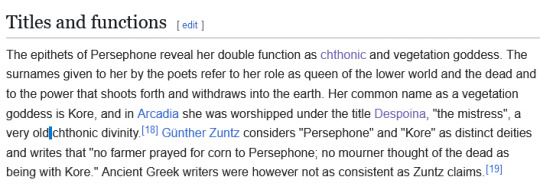
There we go, that has a bit more detail. And from here, we can click the little '19' at the end of the paragraph, which will take us to the References section at the bottom of the page.

Aaaand boom! Now you've got an actual source that you can dig into further, if you so choose. There isn't a whole lot that I can access of this sourced book online, but I was able to find an excerpt where the author sourced Cicero, a Roman poet and philosopher (among other things) who lived during the rise of the Roman empire:

That said, sometimes these sources aren't quite so easy to track down. That's where cross-referencing can help - but that means leaving Wikipedia!
Where this concerns a Greek goddess, let's see what we can find on Theoi, another great resource specifically pertaining to Greek / Roman / etc. deities, stories, and customs.

Though it's not quite as clickable as Wikipedia, Theoi also does a good job at outlining sources in their descriptions. Though Bennett isn't mentioned here, Hesiod and Cicero are, and wouldn't you know it, they're sourced on Theoi as well.



So there you have it! Even though Bennett is from the early 2000's, he did his own work to outline and source poets and academics whose work he was now documenting himself. This means the odds of Bennett simply making shit up are low because he sourced from the preserved works of the era he's speaking on and those works are referenced again through other resource libraries such as Theoi.
What ALL that helps with at the very least - aside from the opinions one could have about the sources themselves (Ovid 😒) - is to legitimize the research. We know without a shadow of a doubt that Persephone was attributed to vegetation and the harvest because there are so many sources across different cultures and backgrounds and generations stating it as such. It thus makes the conclusions a lot more credible, even when they're coming from a more modern source, because that source was built on their own research and sources from the Greek/Roman/etc. documents that have been preserved (and there's still new stuff being found!!!)
Obviously there are always arguments to be made about the material itself, especially when it comes to the debates over translations and cultural contexts, but actually following up on initial searches with referencing and cross-referencing is a lot more reliable and credible than simply taking something from Wikipedia and saying "I read it on the Internet."
As much as the effectiveness of Google and Wikipedia as legitimate research sources is frowned upon, they are incredibly effective, you just need to know where to look and how to find it, and most importantly - how to verify it.
And that's just the online stuff! Libraries are still alive and well! Many universities contribute to search engines like WorldCat which are designed specifically for research papers, published articles, and textbooks! Point is, the world around us is full of knowledge and resources, so the key is to learn how to navigate it so you can get the most out of it!
This is ultimately why it's so important to not restrict yourself to the first Google result - I know it's "easier" due to the convenience of it all, but you're also robbing yourself of the opportunity to really expand your knowledge beyond the summary of a targeted first result, and it runs the risk of sourcing from illegitimate sources or sources that are controlled by Google's own self-interests (protip: have a very specific problem but Googling it just gets you a bunch of automated sponsor posts and completely useless results? add 'reddit' to the end of your search, you'll get human answers from real human beings and there's always at least ONE other person who's had the same problem and posted about it to reddit LMAO seriously this one's saved my skin so many times)
And when you learn to do research the way that works for your brain? It's really, really fun. A lot more fun than public school led many of us to believe. If you learn best from talking and engaging with people, then go talk to people! Participate in groups and forums that are dedicated to the topic you're researching! If you learn best from listening to audio material, then try out audiobooks, they can often be found online through various means (🏴☠️) BUT ebooks and audiobooks are stocked at libraries too!
But of course, that leads us to what makes for bad research, and I obviously can't use any other example in this context than Rachel herself, whose "research" is evidently often the first recommended result that pops up on Google. And yes, I can say evidently because we've proven this when she tried to source the term 'xenia' into LO as a definition. Not only was it copy pasted to the point of still containing typos, but it was sourced plainly from a Princeton study guide that is now severely outdated - not the work that that study guide was sourcing from in and of itself.
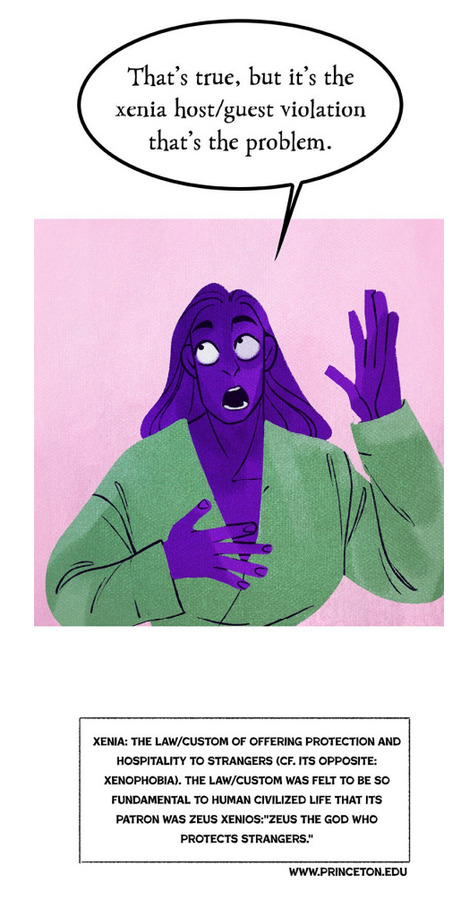



(notice how she just sourced it as "princeton.edu" and not the specific URL that it came from)
If she really wanted to sound well-researched with the cheeky insert of the definition of xenia linking to a smart-sounding location (we're gonna ignore that it ruins the flow of the comic) then she could have sourced it from literally any of these:

But instead she did the equivalent of an 8th grader copy pasting a sentence from Wikipedia and calling it "research". It's not research. It's a lazy shortcut and it doesn't facilitate any real learning.
This can be seen in other instances as well, such as Metis' design:

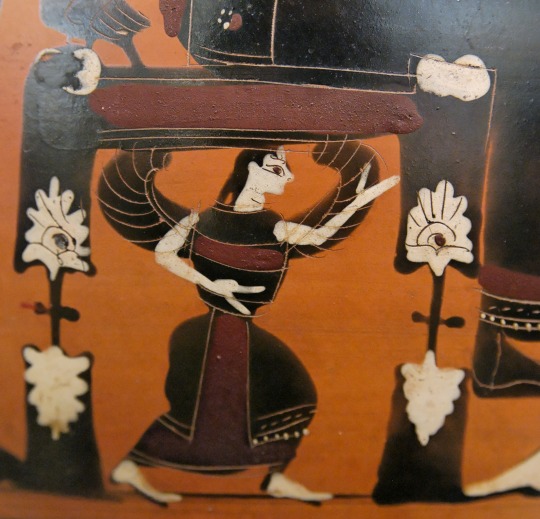
As well as Leto, who I kinda think Rachel mixed up with the Full Metal Alchemist character of the same name when googling her because I can think of no other explanation as to why she's a sun goddess in LO when she has zero affiliation with the sun in the myths aside from being Apollo's mother-

(I can't prove that this is what happened but it's hilarious to think about; I'm also low key suspicious that Rachel accidentally mixed in some sources of the Métis people because Metis' design is very... Indigenous-coded 🤨)
^^^ This. This is all bad research. It's not a bad thing if Rachel's interest in Greek myth started through works like Hercules or other creative adaptions, that's actually how it starts for many of us. Where she failed was by trying to sell herself as a "folklorist" and her work as a "retelling", without actually following through in her research. She would often only do just enough to make herself seem well educated on the subject to anyone whose knowledge was as basic - or less - than hers, but not enough that it could actually hold up in a real discussion about Greek myth with other people who are more read up on it than her. Rachel's self-proclaimed "folklorist" title is only validated by the lowest common denominator of readers, who 99% of Lore Olympus ended up being made for in the end, while those who actually understood the myths deeper than their Wikipedia summaries pulled their hair out in frustration every time Rachel tried to make some sly reference to a myth or attempted to speak about it in interviews.
Comparisons aside, the best part is that this research process doesn't have to be exclusive to studying historical stuff! Writing a story that features a disabled character, but you yourself are not disabled and are worried you're going to misrepresent? Search up articles and posts that pertain to the specific disability you're trying to write; I guarantee you that there are people living with that disability offering up that information completely for free because they want to see more representation for themselves in media. Trying to learn how to draw characters of different body types / skin colors / etc. from your own? Seek out the works and advice of those who do have those physical differences and learn from them.
It's about being thorough. It's about opening yourself up to things you may have been blind to before. It's about embracing the learning experience as a positive sign of growth, not a negative sign of failure. It's about taking the opportunity to learn every time it presents itself, even if those opportunities are small and passive. A person who doesn't know is just a person who hasn't learned yet (๑•̀ㅂ•́)و
#ask me anything#ama#anon ama#anon ask me anything#research advice#writing advice#lo critical#lore olympus critical#anti lore olympus
179 notes
·
View notes
Note
I FINALLY FOUND A TF2 BLOG IM SO HAPPYYY 😭🙏💞💞💞
Can you do headcanons for the mercs, with a reader who's a good cook, basically welcomes them with their favorite foods and drinks when they came back from a battle because she loves all of them very much🍔😚.
(hope this isn't much)
Because of the way this is worded, I'm assuming it's not all separate like I usually do them. So I'll just be writing down random headcanons as they come to me in no specific order
To make this easier on myself, I made this in the context of you used to fight on the team, but after it being deemed unfair for one team to have more people, you took up a job as being a housekeeper of sorts. Like a house spouse but without being married to any of them. You do regular household chores all day and make meals for the mercs, but you only got that job because you asked. How could you possibly leave this darling little band of misfits?
Anyway, I hope you enjoy!
It's a piece of cake
-Even though you were literally getting paid for what you do, they still wanted to show their gratitude. You didn't have to take up that job, after all
-It made them happy to have someone there who would do the chores they just didn't want to. However, they never treated you like a servant
-I mean, obviously, right? They still treated you as a part of the team
-Especially on the nights when you'd make their favorite meals. They can't even begin to imagine how much effort it takes to cook nine different meals just the way they like it
-Sometimes the mercs will collaborate, but they usually have their own way of saying thanks
-Scout would wake up earlier than you to make you a nice breakfast before you have to start your day
-Soldier would most likely make you one of his morbid as hell gifts
-Pyro would probably draw you something for you, but they might bake something for you depending on their energy level
-Demo would get you something he saw you eyeing in one of the shops in town
-I feel like Heavy would tell you not to make dinner for yourself and just relax at the end of the day and make your favorite dinner in return
-Engineer, ever practical, would build you something that makes your job easier. There's a small chance he would just make something nice like a little music box or something
-Medic is a bit strange with his gratitude. He would offer to find ways to enhance your skills to make your job quicker and easier, and implement them if you accept. Yes, he obviously has a random person biologically similar to you to experiment on first to make sure he has it right before trying any surgeries on you
-Sniper would give you small handmade gifts, like a wooden charm of your favorite animal. After a while, if there's an animal you like that basically takes care of itself, he'd get you one
-Spy would find out your favorite scent and get you the best body spray of it he can find. Classy brand, but still exactly the way you like it
-Even when they don't have the means of time to do these things, they are so grateful you stuck around. They care about you a lot, and they truly cannot express just how much they appreciate you
-Aside from all that, they are impressed at how skilled you are at cooking. Not only do you whip up dishes from different countries and cultures, but you put the time and effort into learning how to do it perfectly
-They are absolutely floored the first time you present them with their favorite meals all in the same night, each one cooked to fit the respective mercs taste. To make the meals the way they're supposed to be is one thing, but to make them with every change they would personally make is a whole other level
#team fortress 2#tf2#tf2 fanfiction#team fortress 2 fanfiction#team fortress 2 x reader#tf2 pyro#tf2 scout#tf2 x reader#tf2 medic#tf2 soldier#tf2 demoman#tf2 heavy#tf2 engineer#sniper x reader#tf2 spy#tf2 headcanons
80 notes
·
View notes